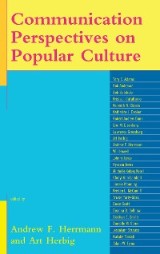Details

Communication Perspectives on Popular Culture
Communication Perspectives in Popular Culture
|
48,99 € |
|
| Verlag: | Lexington Books |
| Format: | EPUB |
| Veröffentl.: | 12.10.2016 |
| ISBN/EAN: | 9781498523936 |
| Sprache: | englisch |
| Anzahl Seiten: | 290 |
DRM-geschütztes eBook, Sie benötigen z.B. Adobe Digital Editions und eine Adobe ID zum Lesen.
Beschreibungen
<span><span>Popular culture helps construct, define, and impact our everyday realities and must be taken seriously because popular culture is, simply, popular. </span><span>Communication Perspectives on Popular Culture </span><span>brings together communication experts with diverse backgrounds, from interpersonal communication, business and organizational communication, mass communication, media studies, narrative, rhetoric, gender studies, autoethnography, popular culture studies, and journalism. The contributors tackle such topics as music, broadcast and Netflix television shows, movies, the Internet, video games, and more, as they connect popular culture to personal concerns as well as larger political and societal issues. The variety of approaches in these chapters are simultaneously situated in the present while building a foundation for the future, as contributors explore new and emerging ways to approach popular culture. From case studies to emerging theories, the contributors examine how popular culture, media, and communication influence our everyday lives.</span></span>
<span><span>Communication Perspectives on Popular Culture</span><span> contains all new writings from many important established scholars as well as brilliant young scholars in the communication field. Contributors explore new and emerging ways to approach popular culture – from case studies to emerging theories – as they examine how popular culture, media, and communication influence our everyday lives.</span></span>
<span><span>Contents<br>Acknowledgments<br>Introduction: Not Another Pop Culture Series! Studying the World(s) We Occupy <br>by Andrew F. Herrmann and Art Herbig<br>Chapter 1: Queering Popular Culture <br>by Tony E. Adams<br>Chapter 2: CultPopCulture: Reconsidering the Popular Culture Framework via the Engage, Adapt, and Transform (EAT) Model <br>by Bob Batchelor<br>Chapter 3: “Saving People. Hunting Things. The Family Business”: Organizational Communication Approaches to Popular Culture<br>by Andrew F. Herrmann<br>Chapter 4: Who's the Boss? Leadership in the Popular Imagination<br>by Eric M. Eisenberg<br>Chapter 5: In Space … Our Worst Will Make Us Scream: Reality Reflected in the Cultural Artifact Alien<br>by Adam W. Tyma<br>Chapter 6: Music’s Pervasive and Persuasive Role in Popular Culture<br>by Deanna Sellnow<br>Chapter 7: Politics and Popular Culture<br>by Trevor Parry-Giles, Will P. Howell, and Devin Scott<br>Chapter 8: Public Relations Representations in Popular Culture: A ‘Scandal’ on Primetime Television<br>by Cheryl Ann Lambert, Jessalynn Strauss, and Natalie T. J. TindallChapter 9: Critical Rhetoric and Popular Culture: Examining Rhetoric’s Relationship to the Popular<br>by Art Herbig<br>Chapter 10: “Prison is bullshit”: An Intersectional Analysis of Popular Culture Representations of the Prison Industrial Complex in Orange is the New Black <br>by Michelle Kelsey Kearl<br>Chapter 11: Polymediating the Post: Reclaiming Feminism in Popular Culture<br>by Danielle M. Stern and Krista Catalfamo<br>Chapter 12: Thinking Conjuncturally about Countercultures<br>by Lawrence Grossberg<br>Chapter 13: Rethinking Studies of Relationships and Popular Culture: Notes on Approach, Method, and (Meta)Theory<br>by Jimmie Manning<br>Chapter 14: Public Opponents Cooperating: Possibilities for Dialogue in Popular Culture Controversies<br>by Rob Anderson and Kenneth N. Cissna<br>Chapter 15: “You Don't Know Me”: Portrayals of Black Fatherhood and Husbandhood in T.I. and Tiny: The Family Hustle<br>by Siobhan E. Smith, Ryessia Jones, and Johnny Jones<br>Chapter 16: Video Gaming: Aggressively Social<br>by Robert Andrew Dunn<br>Chapter 17: Popular Culture, Pedagogy, and Dialoguing Difference Starting Difficult Conversations in the Communication Classroom<br>by Kristen L. McCauliff and Katherine J. Denker<br>Bibliography<br>Index<br>About the Contributors</span></span>
<span><span>Andrew F. Herrmann</span><span> is assistant professor of communication studies at East Tennessee State University.</span></span>
<br>
<br>
<span><span>Art Herbig</span><span> is associate professor of media production at Indiana University – Purdue University, Fort Wayne. </span></span>
<br>
<br>
<span><span>Art Herbig</span><span> is associate professor of media production at Indiana University – Purdue University, Fort Wayne. </span></span>

















